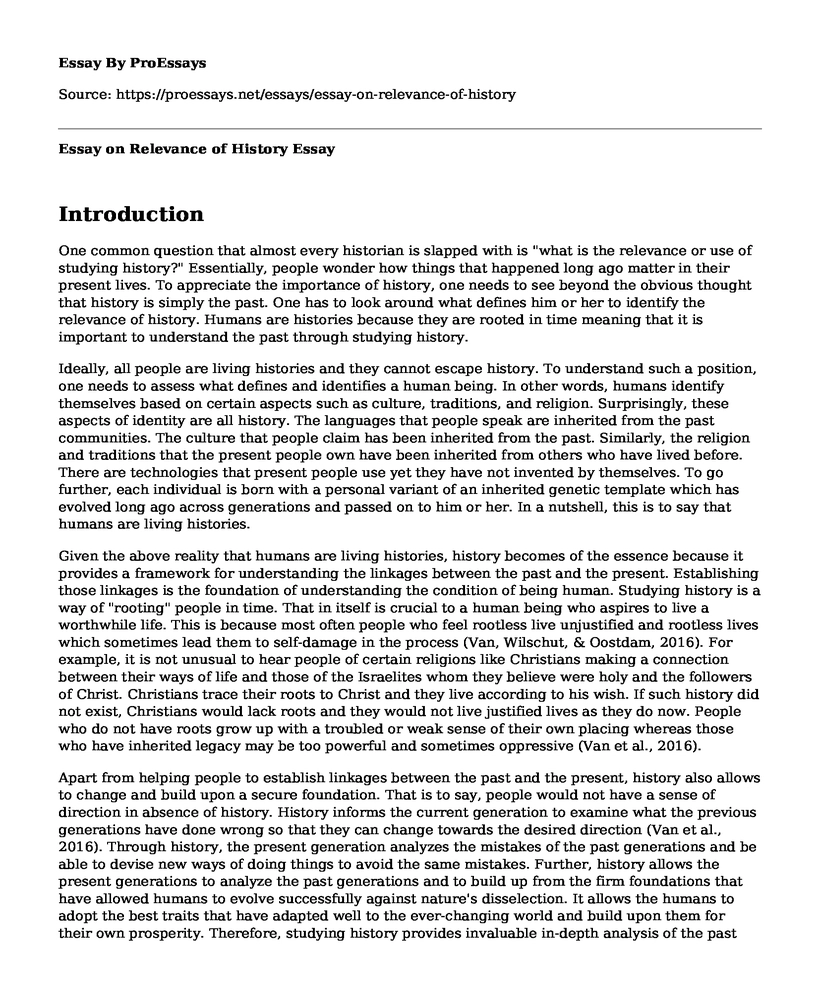Introduction
One common question that almost every historian is slapped with is "what is the relevance or use of studying history?" Essentially, people wonder how things that happened long ago matter in their present lives. To appreciate the importance of history, one needs to see beyond the obvious thought that history is simply the past. One has to look around what defines him or her to identify the relevance of history. Humans are histories because they are rooted in time meaning that it is important to understand the past through studying history.
Ideally, all people are living histories and they cannot escape history. To understand such a position, one needs to assess what defines and identifies a human being. In other words, humans identify themselves based on certain aspects such as culture, traditions, and religion. Surprisingly, these aspects of identity are all history. The languages that people speak are inherited from the past communities. The culture that people claim has been inherited from the past. Similarly, the religion and traditions that the present people own have been inherited from others who have lived before. There are technologies that present people use yet they have not invented by themselves. To go further, each individual is born with a personal variant of an inherited genetic template which has evolved long ago across generations and passed on to him or her. In a nutshell, this is to say that humans are living histories.
Given the above reality that humans are living histories, history becomes of the essence because it provides a framework for understanding the linkages between the past and the present. Establishing those linkages is the foundation of understanding the condition of being human. Studying history is a way of "rooting" people in time. That in itself is crucial to a human being who aspires to live a worthwhile life. This is because most often people who feel rootless live unjustified and rootless lives which sometimes lead them to self-damage in the process (Van, Wilschut, & Oostdam, 2016). For example, it is not unusual to hear people of certain religions like Christians making a connection between their ways of life and those of the Israelites whom they believe were holy and the followers of Christ. Christians trace their roots to Christ and they live according to his wish. If such history did not exist, Christians would lack roots and they would not live justified lives as they do now. People who do not have roots grow up with a troubled or weak sense of their own placing whereas those who have inherited legacy may be too powerful and sometimes oppressive (Van et al., 2016).
Apart from helping people to establish linkages between the past and the present, history also allows to change and build upon a secure foundation. That is to say, people would not have a sense of direction in absence of history. History informs the current generation to examine what the previous generations have done wrong so that they can change towards the desired direction (Van et al., 2016). Through history, the present generation analyzes the mistakes of the past generations and be able to devise new ways of doing things to avoid the same mistakes. Further, history allows the present generations to analyze the past generations and to build up from the firm foundations that have allowed humans to evolve successfully against nature's disselection. It allows the humans to adopt the best traits that have adapted well to the ever-changing world and build upon them for their own prosperity. Therefore, studying history provides invaluable in-depth analysis of the past which in turn confers a long-term perspective to a human being.
Conclusion
Humans are histories and they are rooted in time making history relevant to them. People pick up ideas on the past and its linkages with the present to allow them to establish a sense of direction. History defines humanity and is the foundation upon which further steps can be pegged on. It also informs the necessary change that humans must undertake to survive in the ever-changing world. Without history, humans can be rootless and end up damaging themselves altogether in the process of living without a foundation.
References
Van Straaten, D., Wilschut, A., & Oostdam, R. (2016). Relevance in history teaching: Making meaningful connections between past, present and future. Journal of Curriculum Studies, 48.
Cite this page
Essay on Relevance of History. (2022, Aug 15). Retrieved from https://proessays.net/essays/essay-on-relevance-of-history
If you are the original author of this essay and no longer wish to have it published on the ProEssays website, please click below to request its removal:
- A Spirit Reborn
- Research Paper Example - The History of Egypt: from 3500 BCE to 1650 AD
- Compare and Contrast Mao Zedong and Kim Jong Un's Method of Enforcement
- From Sea Land: South Africa's Great Karoo Essay
- Essay Sample on Morals of Slavery
- Research Paper on 1967 Arab-Israel War: Clash of Two Sides
- Paper Example on Romanian Army Joins Soviet Union's 'Holy War' in 1941







